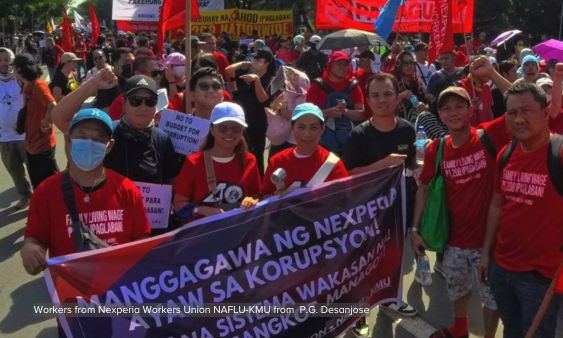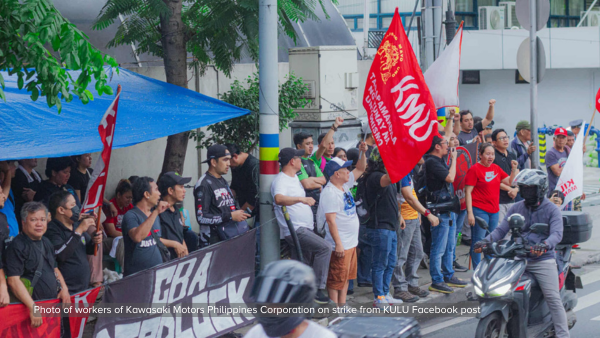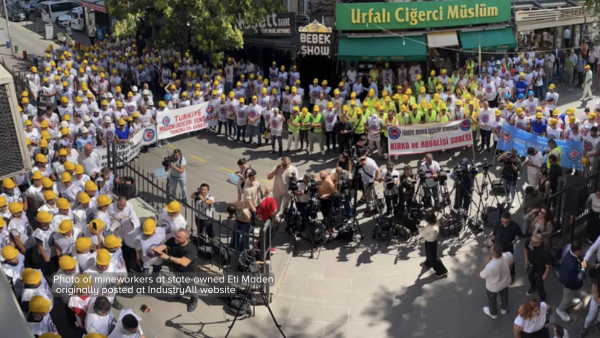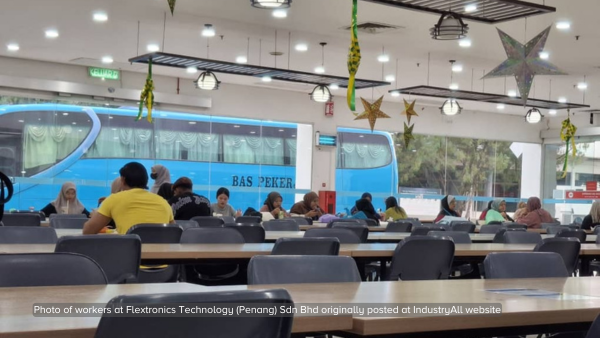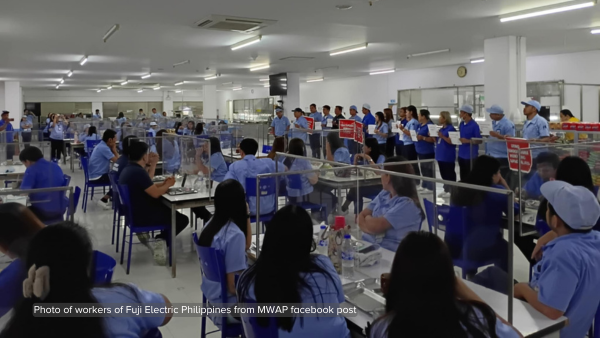Unionised Philips workers made redundant in Indonesia
A couple of short news stories sneaked into the regional paper Eindhovens Dagblad late last June: a round of dismissals and a strike at a Philips factory that produces smoothing irons. Local union FSPMI denounced cases of intimidation and brought in the Dutch union FNV to take up the issue with Philips. How does Ron van Baden Ron van Baden is an FNV negotiator of collective bargaining agreements, and reorganisation and pension plans. He carries out this work as a union leader in cases involving the electronics manufacturers Philips, ASML, and until recently, NXP. Within FNV he is a regional leader for Brabant and Limburg provinces in the Netherlands. He is also working on a PhD research on labour flexibility and production chains at the University of Tilburg. His master’s thesis looks at economic dips and seeks to identify the segments of the production chain that are hardest hit by those dips. @RonvanBaden look back on the case?
As a contact person within the FNV for Philips-specific cases, Van Baden is regularly approached in connection with the electronics company’s labour conflicts abroad. Such was the case with the conflict involving Philips on Batam, a small Indonesian island and free-trade area near Singapore.
Intimidation
The metal union FSPMI, which has long been in close contact with the GoodElectronics Networks, set up a local department on Batam, in the Philips factory. Soon, all employees who had attended the founding meeting were being fired. A case of union-busting, according to FSPMI. Or… sheer coincidence? “It was just a round of efficiency-seeking dismissals, we respect local legislation, and among the 83 redundancies there were also non-members of the union” – as Philips put it in a reaction to the accusation of union busting. What exactly happened?
Truth-finding
“In the Netherlands we also see that union members are kicked out during reorganisations,” Van Baden acknowledges, and he knows this first-hand. “The fact that union members are being fired doesn’t immediately imply that the company is engaged in union-busting. But I do believe that, as a leading company, if you receive the slightest indication that unions are being intimidated, you should investigate the case in depth.” It should be noted that, at FNV’s insistence, Philips did in fact raise the issue with the management on Batam. “But that alone doesn’t qualify as truth-finding”, according to Van Baden. “I’m not inclined to simply trust Philips on their word, their information is often biased. The fact that they were taking cost-reduction measures does not rule out that there was also union-busting going on.”
Response from Philips
The FSPMI union suggests that the dismissals were carried out in violation of labour laws. Philips should have first searched for alternatives, such as ending overtime work, but didn’t. The company’s response is that they did indeed take such measures, including overtime cuts. Initially, local government officials reportedly concluded that the dismissals were not illegal. They have subsequently stated that they actually found Philips’ efficiency measures to be ‘flawed’, according to the FSPMI union. The union is trying to receive a written confirmation of these findings.
“Legislation in countries like Indonesia is not unambiguous, and its enforcement is far from adequate,” replies Van Baden.
According to the local union, the workers from outside Batam who were fired were sent home, off the island, shortly after their dismissal. It is therefore unsurprising that only 16 of the 83 redundant workers demanded to have their dismissals reversed.
The Dutch headquarters of Philips stress that the term ‘union-busting’ is a factually incorrect description of the situation on Batam. But they also say that it’s a matter of opinion whether or not you can call it union-busting. The company refers to its Code of Ethics, which mentions freedom of association. Of the 16 employees who contested their dismissal, 11 have now reached an agreement. Philips insists that the strike was held without any incidents and that the strikers were not intimidated. But it is still remarkable that Philips Batam went on to publish new job postings shortly after the dismissals.
Solidarity
The worldwide union federation IndustriALL, which, like FNV, is a member of the GoodElectronics Network, came out with a resolution in June in support of the dismissed Philips employees. IndustriALL calls on Philips to reverse the unfair dismissals immediately, to stop intimidating union leaders and to make sure that all its employees can join the union of their own choice.
Boomerang
If the dismissals were intended as a union-busting strategy, they certainly didn’t produce the desired effects. Within five days, 500 of the factory’s 1900 workers signed up with FSPMI. The employees engaged in campaigns to roll back the dismissals and went on strike. The strikers reported that they had been chased off the factory compound by the company management, possibly assisted by local authorities. Incidents of intimidation and the use of a water hose were also reported. Philips denies all accusations, but various videos suggest that security tried to chase away the labour rights activists.
Mediation
Negotiations between the workers on strike and the management seemed at first to be going nowhere. But in the end they agreed to seek mediation regarding the dismissals. If this failed to produce a solution, they would resort jointly to the Indonesian Industrial Relations Court. Cases treated there are in fact often resolved in favour of the companies. As part of the agreement, the strike was called off and Philips would continue to pay the strikers’ wages.
Government
In the meantime the local government suggested in the media that the Philips employees would do better to go back to work. Several different companies have already left Batam, and Philips could be next, argued the local governor. And that would allegedly lose Philips Batam and its associated businesses 10.000 jobs.
Expected profits
Van Baden sees evidence in the Batam case that Philips is under pressure to come up with good business figures for its shareholders.
“Philips is on the cusp of a historic moment. They are about to split into two independent businesses: Lighting Solutions and Healthtech. The light division will subsequently be sold. In the meantime the corporation must prove that it can bring its profit ambitions to fruition. Philips CEO Frans van Houten has already had to explain to analysts on a few occasions why their results were lower than expected. All the floodlights are turned on their rate of return, and Philips must therefore stay very closely on course. The costs are being pushed down as much as possible and its sales figures must go up.”
At times like this it is not unusual for a local management to be requested to cut costs drastically, and dismissals tend to deliver these cost cuts very rapidly.
Addressing grievances
“At the same time, Indonesian unions are visibly becoming more self-aware,” as Van Baden has noticed. “Management teams also need to acquire experience and learn how to respond. But a leading company has to play an exemplary role in the way it deals with disputes. It’s not just a question of fulfilling the law or not, as Philips claims to do in this case. There is plenty of national legislation around the world that isn’t at all up to the mark and in line with our values. But this must never be an excuse to grant unions less rights and to intimidate people. It would mean that you’re heading for rock bottom, shifting your business activities to the places where standards are set the lowest.”
Noblesse oblige
The least you can expect from market leaders is that they set themselves high standards, asserts Van Baden.
“I expect that companies such as Philips, HP, Apple, Dell and Microsoft will also behave as leaders regarding ethical issues, and not just settle for ‘complying with national legislation’. Philips profiles itself as a company that delivers health and wellbeing. That also applies to this kind of cases.”
Yellow union
Reaching a provisional agreement was possible thanks to the support provided to the strikers by FNV and the worldwide federation IndustriALLl, suggests Van Baden. But he is worried about new reports that the mediation that was agreed on is not taking off, and that the factory management could be setting up its own union. So-called yellow unions are notorious for being a mouthpiece for management instead of defending the workers’ interests.
“Setting up a yellow union might not be forbidden by law, but it can also be seen as a form of union-busting,” argues Van Baden.
Management is reported to be handing out FSMPI union membership cancellation slips together with their own sign-up forms. Philips denies that this new union is a company union, and insists that it is established on the initiative of its employees rather than its local management.
Deadlock?
“The troubled mediation process might point to a lack of goodwill to reach an agreement with FSPMI,” says Van Baden with a sigh. “We have to keep close tabs on it. Another determining factor in cases like this is how professional and persevering the local people themselves are.”





